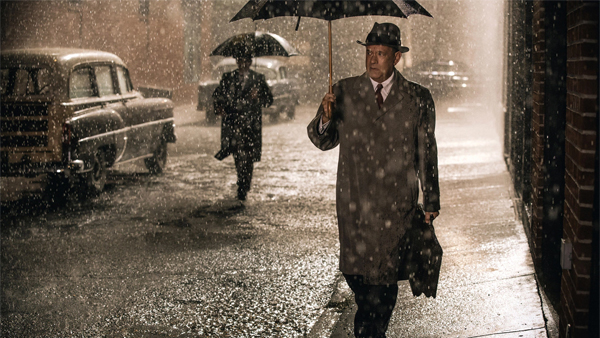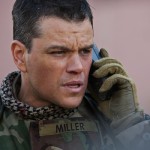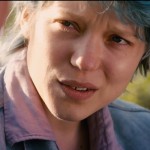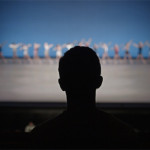Bridge of Spies Review
In Steven Spielberg’s Cold War drama Bridge of Spies, Mark Rylance plays a man named Rudolf Abel. Accused of spying on the United States for the Union of Soviet Socialist Republics, Abel is potentially looking at the electric chair if convicted. Legal representation is offered by James Donovan (Tom Hanks), who’s utterly perplexed by his client’s seemingly non-plussed attitude toward his circumstances. When asked by Donovan if he at all feels worried, Abel quips, “Would it help?”
It’s one of the few lines in the movie that’s obviously played for laughs — maybe it was one added by the Coen Brothers during their touching up of Matt Charman’s original script. And it’s a conversation that relates uniquely back toward the film itself because Bridge of Spies would be helped a lot by some worry, concern, anxiety, or some other noun that conveys a hightened sense of emotion. Bridge of Spies is colder than East Germany in winter without an overcoat.
That said, scenes in this movie have lingered in my memory. If the old adage is true that a great film must have three great scenes, Bridge of Spies is objectively a great film. There’s Rylance’s “standing man” monologue during which he extolls his lawyer for putting his country’s honor above his own. Donovan’s first jaunt across the newly-constructed Berlin Wall is a master’s demonstration in building restrained tension. And the scene that one could say the film’s title is derived from brings these characters and the film’s themes full circle in a truly sensational way.
And those are just three. Bridge of Spies‘ biggest problem is that the whole doesn’t quite add up to the sum of its parts, but its parts are simply incredible and more than make up for the final product’s minor deficiencies.
Donovan is the film’s heart and soul — a “boy scout” who’s good at what he does (insurance law) and parlays that into a role he never imagined for himself (prisoner exchange negotiator). His treatment and defense of Abel get him into hot water with the public, his law firm, and his family — bullets even tear up his home at one frightening point — but he never takes his eye off the ball, and when the CIA comes calling with an idea, he’s all ears.
Tom Hanks is perfect for the role of Donovan. It’s not as meaty as the one he played so well in Captain Phillips, for instance — Donovan is focused on goal over safety to an almost unrealistic degree sometimes — but the film’s Capra-esque tendencies serve someone like Hanks quite well. He’s matched by the understated grace of Mark Rylance in almost every scene they share. It’s a quiet performance but one that will stay with you.
As he did with his last film, Lincoln, Spielberg stays out of the way for most of Bridge of Spies. He lets his actors act, his craftsmen craft, and his screenplay do the talking. Like Lincoln, then, the film’s biggest problem is a periodic lack of energy and immediate emotion that make it feel a lot longer than it actually is (140 minutes). It’s almost hard to believe that the guy who made Jaws, Raiders of the Lost Ark, and Jurassic Park has now crafted two back-to-back stoic historical dramas. Not that such a pace is unfamiliar to Spielberg, nor is it something he’s incapable of pulling off. No, it’s just a speed I don’t think of when you mention the great director’s name, but good for him for not sacrificing his vision to satisfy the over-caffeinated masses.
I mentioned the craft on display, and it’s as good as you’ve come to expect from masters like Janusz Kaminski and Thomas Newman. The former’s cinematography, like Lincoln‘s, is reliant on extreme and extremely white lighting through windows and doorways, and his weather-heavy scenes in rainy Brooklyn and snowy Berlin are gorgeous. The latter’s score is subtler than you might expect, but absolutely perfect. Michael Kahn’s editing is aces, and production designer Adam Stockhausen (a Spielberg newcomer) is timely and appropriate.
Bridge of Spies is probably minor Spielberg, but that makes it sound like a worse film than it is. In fact, when your career is filled with five, six, or seven genuine masterpieces, something like Bridge of Spies will feel lesser, but up against some of what 2015 has to offer, it’s a very strong film — a drama first that thrills second and a beautiful film visually and emotionally that I’m excited to study and enjoy in the years to come.
















